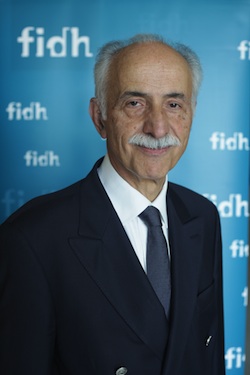Source: FIDH
February 11th 2015 marks the 36th anniversary of the Islamic regime in Iran. FIDH’s President Dr. Karim Lahidji answers questions about freedoms and liberties in Iran today.
February 11th, the anniversary of Ayatollah Khomeini coming to power in Iran, marks for many people the end of the repression of those who spoke out against the regime of the Shah. Today, what is life like for those who disagree with the current Islamic regime? Can those who disagree with the regime, or who speak out regarding its human rights record, speak freely in Iran?
Dr Karim Lahidji : The anti-dictatorial movement that began in the spring of 1977 had a single slogan, “Freedoms”, and unanimously supported one important demand: freedom for the thousands of political prisoners in Iran. At that time Iranian civil society (including the first Iranian Human Rights League [1], the association of Iranian jurists, and the association of Iranian writers) and the political parties of the opposition came together to call for free elections, the elimination of repressive policies (such as the Savak [2]), respect for freedom of expression and of the media, and the establishment of a multi-party political system instead of the single party system which had been put in place by the Shah. (All of these demands were already enshrined in the 1906 Iranian Constitution and in the international human rights instruments recently ratified by the Iranian parliament, notably the International Covenant on Civil and Political Rights, and the International Covenant on Economic, Social, and Cultural Rights.) Unfortunately, during an entire year the Shah not only ignored these calls, but chose instead to repress dissenting voices and forced Iraq to banish Ayatollah Khomeini who had been living in exile there for the past 13 years. Upon arriving in France in 1978, Khomeini radicalised the opposition movement, demanding the departure of the Shah and the establishment of an Islamic regime, which according to him was not incompatible with the fundamental rights and freedoms that the Iranian people were calling for.
Unfortunately, the reality of life under the Islamic regime has been all but the opposite of those liberties that the Iranian people had called for. The victory and freedom felt by the people of Iran after the fall of the Shah ewas short lived, and were quickly overshadowed by the extra judicial killing of certain leaders from the previous regime, the successive closing down of independent media outlets, the adoption of an anti-democratic and oligarchic constitution, and the majority of the Shah’s prisoners being sent back behind bars, sentenced to death or outright executed.
At this time, civil society groups also became the targets of repression: forced closures, arrest warrants, detentions, and heavy sentences aimed against their leaders. This sad reality has persisted for the last three decades, with the exception of a short period when a reformist government took power and allowed for the creation, in 2001, of the Defenders of Human Rights Center by five lawyers including future Nobel Laureate Shirin Ebadi. Eventually, the Center was also forcibly shut down, and its founding members prosecuted and sentenced: Abdolfattah Soltani and Mohammad Seifzadeh are still behind bars, Shirin Ebadi is in exile, Nargess Mohammadi is again facing charges, and Nasrin Sotoudeh was recently released after three years in prison, but her law licence has been suspended.
Still on the subject of freedom of expression: What was Iran’s reaction following the recent attack on Charlie Hebdo in France and the global calls in support of freedom of expression? If those who question the regime in Iran face harsh repression, what of those who openly question religion under the rule of the Islamic regime?
K.L.: Immediately following the attack on Charlie Hebdo, the current Iranian government formally condemned the massacre. However, when Charlie Hebdo subsequently published another drawing of the Prophet Mohammed, the Iranian authorities authorised angry protests against the publication.
Particularly with regards to religion, freedom of expression in Iran is not respected, and blasphemy against Islam is a crime that carries the death penalty. Any type of criticism or questioning of a “sacred” person, such as the Prophet or imams, is considered heresy and is punishable by death. Moreover, the concept of what is “sacred” is interpreted in such a broad and arbitrary way that even a minor criticism of the regime is considered as defamatory and insulting and is severely punished.
Freedom of religion and belief is also not guaranteed in Iran. An Iranian born as a Muslim does not have the right to convert to another religion, for fear of being executed. Religious minorities that are recognized in the Iranian Constitution are free to practice their own religious ceremonies, but are prohibited from proselytising. However, Iran’s largest religious minority, the Ba’hai, is not even recognized in the Constitution, and its members are discriminated against and persecuted. Many Ba’hai leaders have been in prison for years, targeted simply for practising their religion.
-------------------------------------------
League for the Defence of Human Rights in Iran (LDDHI) - FIDH member
جامعه دفاع از حقوق بشر در ایران (عضو فدراسیون بین المللی جامعه های حقوق بشر)ـ
فیس بوک http://www.facebook.com/lddhi.fidh
E-mail: lddhi(at)fidh.org یا lddhi.fidh(at)gmail.com
Twitter: @fidh_fa
Youtube: https://www.youtube.com/channel/ UCLy2KJACyt0kXaOm53OXtEw صفحه ایرانِ فدراسیون بین المللی جامعه های حقوق بشر
صفحه فارسی فدراسیون
FIDH's Iran page: http://www.fidh.org/en/asia/iran/


